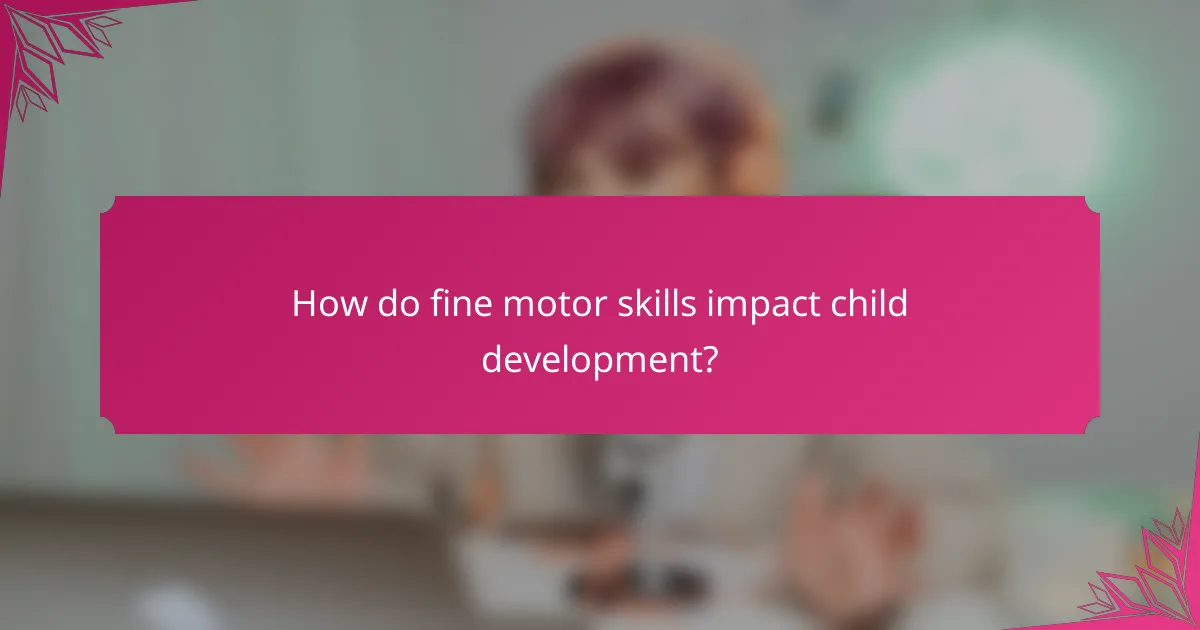Engaging children in fun activities that enhance fine motor skills is essential for their overall development. These activities promote hand-eye coordination, dexterity, and control, which are vital for performing everyday tasks. By participating in age-appropriate challenges, kids not only improve their physical abilities but also foster creativity and problem-solving skills.

What are the best activities for developing fine motor skills in kids?
Activities that enhance fine motor skills in kids focus on tasks that require hand-eye coordination, dexterity, and control. Engaging in these activities not only supports physical development but also encourages creativity and problem-solving.
Arts and crafts projects
Arts and crafts projects are excellent for developing fine motor skills as they involve various hand movements and tool usage. Activities like painting, drawing, or making collages require children to manipulate materials, which strengthens their grip and coordination.
Consider providing a variety of materials such as scissors, glue, and different types of paper. Simple projects like creating greeting cards or decorating picture frames can keep kids engaged while enhancing their motor skills.
Puzzles and building blocks
Puzzles and building blocks are effective for improving fine motor skills through problem-solving and spatial awareness. As children fit pieces together or stack blocks, they practice grasping, balancing, and manipulating objects.
Choose puzzles with varying difficulty levels to match your child’s age and skill level. Building sets like LEGO can also be beneficial, allowing for creative construction while enhancing dexterity.
Playdough and clay modeling
Playdough and clay modeling activities are fantastic for strengthening hand muscles and improving coordination. Kneading, rolling, and shaping these materials require a range of movements that develop fine motor skills.
Encourage kids to create different shapes or figures, which can be both fun and educational. You can also introduce tools like cookie cutters or rolling pins to add variety and challenge.
Threading and lacing activities
Threading and lacing activities involve passing string or thread through holes, which enhances hand-eye coordination and precision. These tasks require focus and control, making them ideal for fine motor skill development.
Use items like beads, buttons, or lacing cards to create engaging projects. Start with larger items for younger children and gradually introduce smaller ones as their skills improve.
Scissor skills practice
Practicing scissor skills is crucial for developing fine motor control and hand strength. Cutting along lines or shapes helps children learn how to manage scissors safely and effectively.
Provide child-safe scissors and practice materials like paper or cardboard. Start with straight lines and progress to curves and complex shapes to build confidence and skill over time.

How do fine motor skills impact child development?
Fine motor skills are crucial for child development as they enable children to perform tasks that require precision and coordination. These skills influence various aspects of a child’s growth, including their ability to engage in everyday activities and their overall cognitive development.
Improved hand-eye coordination
Fine motor skills significantly enhance hand-eye coordination, which is essential for activities like writing, drawing, and playing sports. When children practice tasks that require precise movements, they develop better control over their hands and eyes working together.
Engaging in activities such as threading beads, building with blocks, or playing catch can improve this coordination. These exercises help children learn to judge distances and timing, which are vital for many physical activities.
Enhanced cognitive abilities
Developing fine motor skills is linked to improved cognitive abilities, including problem-solving and critical thinking. As children manipulate objects and engage in hands-on activities, they learn to think creatively and develop strategies to overcome challenges.
For instance, puzzles and construction toys not only enhance dexterity but also encourage logical thinking and spatial awareness. These cognitive skills are foundational for academic success as children progress through school.
Boosted confidence and independence
As children master fine motor skills, they often experience a boost in confidence and independence. Successfully completing tasks like tying shoelaces or using scissors empowers children to take on new challenges without assistance.
Encouraging children to practice these skills through play fosters a sense of achievement. Parents can support this development by providing opportunities for children to engage in self-care tasks and creative projects, reinforcing their ability to do things on their own.

What are the recommended age-specific activities?
Recommended age-specific activities for developing fine motor skills vary significantly from toddlers to school-aged children. Engaging in these activities helps enhance dexterity, coordination, and overall motor development, which are crucial for everyday tasks and learning.
Activities for toddlers
For toddlers, activities should focus on simple tasks that encourage grasping and manipulation. Options include stacking blocks, playing with soft building toys, and engaging in finger painting. These activities promote hand-eye coordination and strengthen small muscles in their hands.
Consider providing materials that are safe and easy to handle, such as large beads for stringing or playdough for squeezing and rolling. Always supervise to ensure safety and to encourage exploration.
Activities for preschoolers
Preschoolers can benefit from more complex activities that challenge their developing skills. Activities like cutting with child-safe scissors, threading laces through holes, and using tweezers to pick up small objects are excellent choices. These tasks enhance precision and control.
Incorporate arts and crafts projects, such as collages or simple origami, to further develop fine motor skills while allowing for creativity. Encourage children to practice these skills regularly, as repetition aids mastery.
Activities for school-aged children
School-aged children can engage in activities that require greater dexterity and concentration. Examples include model building, sewing simple patterns, or playing musical instruments. These tasks not only refine motor skills but also foster patience and focus.
Encourage participation in sports or activities that involve hand-eye coordination, such as basketball or table tennis. These physical activities complement fine motor skill development and promote overall fitness. Regular practice is key to improvement, so set aside time for these engaging tasks.

How can parents encourage engagement in fine motor activities?
Parents can encourage engagement in fine motor activities by providing opportunities for hands-on play that develop these skills. Activities like crafting, building, and manipulating small objects can significantly enhance children’s dexterity and coordination.
Creating a dedicated play space
Establishing a dedicated play space allows children to explore fine motor activities without distractions. This area should be equipped with various tools and materials, such as building blocks, art supplies, and puzzles, to stimulate creativity and skill development.
Ensure the space is safe and accessible, allowing children to freely choose their activities. Consider using low tables and storage bins to keep materials organized and within reach, promoting independence and engagement.
Incorporating play into daily routines
Integrating fine motor play into daily routines can make skill development a natural part of life. Simple tasks like helping with cooking, sorting laundry, or gardening can provide valuable practice for children’s hands.
Encourage children to assist with age-appropriate chores that require gripping, pinching, or manipulating objects. This not only builds fine motor skills but also fosters a sense of responsibility and accomplishment.
Setting up playdates with peers
Organizing playdates with peers can enhance fine motor skill development through social interaction. When children play together, they often engage in activities that require cooperation and sharing, which can lead to more complex motor tasks.
Choose activities that promote collaboration, such as building projects or arts and crafts. This not only encourages fine motor engagement but also helps children learn from each other and develop social skills.

What are the benefits of using educational toys for fine motor skills?
Educational toys significantly enhance fine motor skills by engaging children in activities that require precise hand movements. These toys promote dexterity, coordination, and cognitive development, making them essential for early childhood growth.
Promotes learning through play
Learning through play is a fundamental aspect of child development, and educational toys facilitate this process by making skill-building enjoyable. When children manipulate toys, they naturally develop fine motor skills while exploring concepts like cause and effect, spatial awareness, and problem-solving.
For instance, toys such as building blocks or shape sorters encourage children to use their hands in various ways, improving grip strength and hand-eye coordination. Engaging with these toys can also foster creativity, as children invent new ways to play and interact with their environment.
To maximize the benefits, choose toys that are age-appropriate and safe, ensuring they meet local safety standards. Look for options that challenge your child without causing frustration, allowing for a balance of fun and learning.
